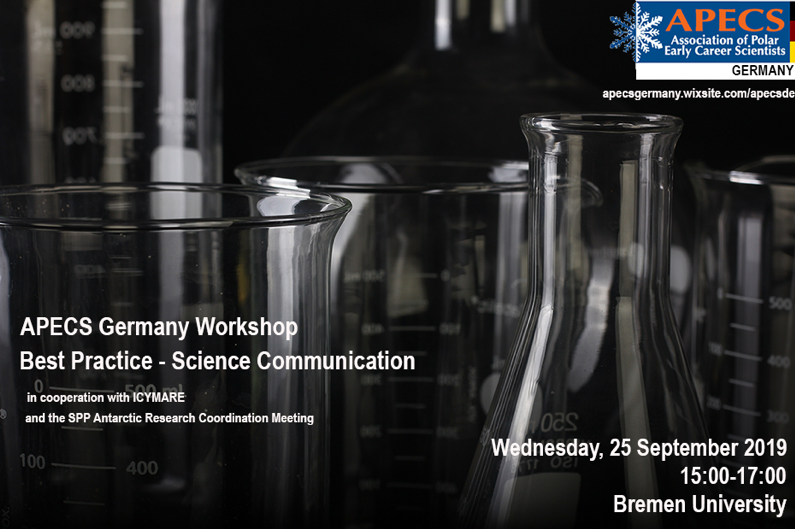 How experienced are you in science communication? Do you prefer “online” or “in-person” science communication?
How experienced are you in science communication? Do you prefer “online” or “in-person” science communication?
How do I choose the right words when talking about science? How do I connect to my audience?
Those were only a few of the questions that the 35 participants discussed among themselves and with three experts during the APECS Germany workshop “Best practice: Science communication” on the 25th of September 2019 in Bremen. Within the context of the International Polar Week 2019, the workshop took place in cooperation with the ICYMARE 2019 conference and the SPP Antarctic Research Coordination meeting. Bachelor, Master and PhD students, post-docs and young professionals from many disciplines joined us, creating a great atmosphere for exchange on one of the hot topics of the researcher’s world: science communication.
 Due to the wide range of this topic, we could have organized a week-long workshop, but in the short two hours time frame, we aimed for an introduction to the various opportunities for science communication and an exchange of “best practice tips” between our experts and the participants. To cover some aspects of the diverse topic, we invited three panel speakers with different backgrounds.
Due to the wide range of this topic, we could have organized a week-long workshop, but in the short two hours time frame, we aimed for an introduction to the various opportunities for science communication and an exchange of “best practice tips” between our experts and the participants. To cover some aspects of the diverse topic, we invited three panel speakers with different backgrounds.
 Our first speaker Ulrike Prange, press officer at Marum, a large marine research institute, helped us to bridge the gap between scientists and journalists. She encouraged us to be visible as an expert in our field, e.g. on our institutes homepages, but also on social media or in person during events like the science-goes-public pub-format. Furthermore, Ulrike made clear that we could always ask the media departments of our institutes and universities for help and cooperations. For any contact with journalists she advised to react as soon as possible, especially when the journalists works for the daily press. Great tips for communication with the media were published by the European Geosciences Union.
Our first speaker Ulrike Prange, press officer at Marum, a large marine research institute, helped us to bridge the gap between scientists and journalists. She encouraged us to be visible as an expert in our field, e.g. on our institutes homepages, but also on social media or in person during events like the science-goes-public pub-format. Furthermore, Ulrike made clear that we could always ask the media departments of our institutes and universities for help and cooperations. For any contact with journalists she advised to react as soon as possible, especially when the journalists works for the daily press. Great tips for communication with the media were published by the European Geosciences Union.
The second panel speaker was Andreas Vogel, manager of the planetarium in Bremen. He gave us great hands-on examples of how to engage an audience with a complex, unfamiliar topic - such as the universe. Andreas demonstrated how to make incomprehensibly large numbers more tangible, and talked about the thin line between simplifying, but still teaching facts to a greater audience. His positive experiences with an increasing interest of the public in science in the planetarium left us encouraged to continue with our efforts to make our science more open to the public. Depending on the format, he also showed us the powerful effect of music and a good joke for engaging people.
Lars Kaleschke, researcher at the AWI Bremerhaven, finished our panel talks with an insight into his own efforts in science communication, which started with an own web page where he published part of his work, and extends now to tweets that reach up to thousands of people and invitations to media events. He underlined how important it is to share our research with others actively in order to be found by e.g. journalists. For eye-catching posts that stick out of the mass, Lars encouraged us to use new visualization techniques that are mastered by e.g. @ZLabe, @ed_hawkins. We realized: narrowing down our key result in 140 words in a language that everyone understands is a big challenge - but if we manage, not only our audience but we will also have learnt a lot from it!
 This made a smooth transition into our workshop phase in which we split up in groups dealing exactly with the challenges identified before:
This made a smooth transition into our workshop phase in which we split up in groups dealing exactly with the challenges identified before:
• Choosing the right words (How does everybody understand me?)
• Online Science Communication - write your first tweet!
• Knowing your audience - how to adapt your communication
• Your “Best of” science communication and other forms you have seen.
Thanks to the input of our workshop participants and our three panel speakers we had vibrant discussions that were summarized on flipcharts.
All in all, we realized that science communication is a “learning while doing” experience and that we should not hesitate to start if we are interested in it. We also got to know that nearly every research institute has professionals for science communication employed. Thus, if you are inclined to start with science communication but need some help: just ask around in your institute.

We thank all the participants and our panel speakers for their attendance and input.
The report is also published on the APECS Germany website.
Photos: © Mara Muchow


